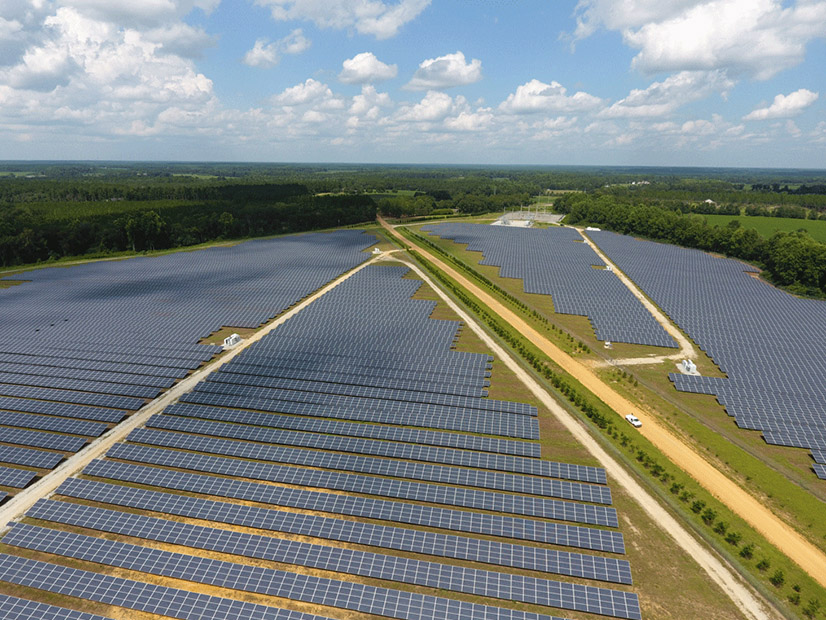The Massachusetts Commission on Energy Infrastructure Siting and Permitting on March 29 issued detailed recommendations to state lawmakers as they consider significant revisions to state processes for developing energy projects.
The commission was established by Gov. Maura Healey (D) in the fall and featured representatives from a range of industry, government and nonprofit backgrounds. (See Massachusetts Announces Permitting And Siting Reform Commission.)
The recommendations focus on consolidating and expediting state and local permitting processes for clean energy infrastructure, while creating standardized requirements for early community engagement.
“Massachusetts’ current siting and permitting processes are causing significant delays in the clean energy transition,” Energy and Environmental Affairs Secretary Rebecca Tepper said in a statement. “By cutting red tape and building in better opportunities for meaningful stakeholder engagement, Massachusetts can ensure needed clean energy infrastructure is built more quickly and responsibly.”
The commission called on the legislature to establish a new consolidated permitting process for clean energy infrastructure at the state’s Energy Facilities Siting Board (EFSB), which would issue permits that “encompass all state, regional and local permits that a clean energy infrastructure project would otherwise be required to obtain to commence construction and operation.”
The EFSB also should be required to decide on permits within six to 15 months of its verification that an application is complete, the report said.
While larger clean energy, storage, and transmission and distribution projects would be under the jurisdiction of the EFSB, the commission also recommended the legislature establish a consolidated permitting process for smaller projects that fall outside the EFSB’s jurisdiction.
“Legislation should be enacted to establish a process by which a single consolidated permit is issued by a municipality to an applicant for non-EFSB jurisdictional clean energy infrastructure,” the recommendations said, noting that this permit would cover all local permits required of a project, but not state, regional or federal permits.
The report also called for the creation of a Division of Energy Siting and Permitting within the Department of Energy Resources, which would be aimed at helping municipalities with clean energy permitting.
Community Engagement
Along with proposals to speed up and increase the efficiency of permitting and siting, the commission also made a series of recommendations intended to strengthen community engagement for energy infrastructure projects.
The commission called for standardized pre-filing community engagement requirements for project developers, including community notifications, public meetings, comment opportunities and efforts to engage local organizations. It also recommended the EFSB create a new “Office of Community Engagement” to help applicants and communities in the engagement and permitting processes.
The report also recommended creating pre-filing community engagement requirements for non-EFSB jurisdictional projects, along with “a uniform set of baseline health, safety and environmental standards to guide municipalities in the issuance of permits for clean energy infrastructure.”
Like legislation that has been backed by environmental organizations, the report also recommended updating the EFSB’s statutory mandate to include consideration of the state’s climate targets and laws relating to environmental justice, labor standards and public health. It also recommended adding Indigenous and environmental justice representation to the EFSB. (See Mass. EJ Groups Rally Behind Permitting, Siting Reforms.)
Environmental organizations also have advocated for the addition of cumulative impact assessments to the permitting process to protect environmental justice communities, but the commission noted it “could not come to agreement on whether to include such language.”
The report did recommend that fossil fuel infrastructure – which would not be included in the expedited process – should be subject to a cumulative impact assessment, along with “the same community engagement and benefit requirements as clean energy infrastructure.”
Next Steps
While some of the recommendations could be implemented without legislation, many of the recommendations would need to be achieved through legislation.
Massachusetts legislators have indicated permitting and siting reforms are among their top priorities for this year’s session, and lawmakers have introduced multiple reform proposals. (See Mass. Lawmakers Aiming for an Omnibus Climate Bill in 2024.)
The House side of the legislature’s Joint Committee on Telecommunications, Utilities and Energy (TUE) favorably reported a bill this year that would create a consolidated permitting process while establishing early community engagement requirements. TUE Co-Chairs Rep. Jeff Roy and Sen. Mike Barrett were nonvoting members of the commission.
“I think everyone was resolved that we need to do something to speed up the permitting and siting process in order to achieve our goals,” Roy told NetZero Insider. “But just how best we can achieve that was difficult.”
Roy said he will work in the coming weeks to reconcile the commission’s recommendations with his initial proposal “to see if I can come up with a solution that will pass muster in the House.”
He added that some of the key points of contention at the commission included how much local control should be maintained, the definition of clean energy projects and which state entity should oversee the consolidated process.
The Healey administration has not yet indicated whether it plans to submit a new bill or work with legislators to incorporate the recommendations into existing proposals. The 2024 legislative session ends at the end of July, putting a deadline on the negotiations.




